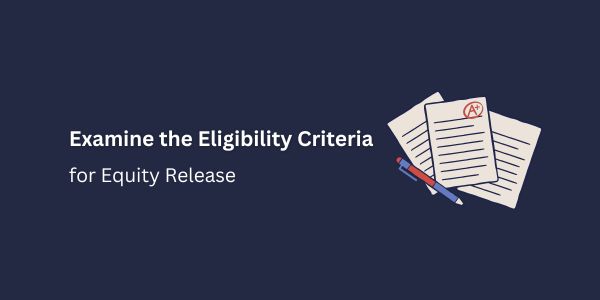Equity release is a popular solution for those looking to access the wealth stored in their property. It can provide financial flexibility, allowing homeowners aged 55 or over to unlock cash tied up in their homes without moving out. But what about those who are younger than this?
Is Equity Release for Under 55 an Option?
This guide will look at the availability of equity release for those below the traditional age threshold. In addition, we’ll discuss the types of products available, eligibility criteria, and potential risks associated with taking out an equity release plan. This information lets you determine whether equity release suits your financial needs.
Understand What Equity Release Is and How It Works
Equity release is a financial product that allows you to use the equity in your home to access a lump sum or regular income payments.
Equity release typically involves taking out a loan. Still, instead of making monthly payments to a lender, the loan is repaid when you, the homeowner, pass away or move into a long-term care facility.
To be eligible for an equity release product, you must be over 55 and own a home in the UK.
Understanding the different types of equity release products, such as lifetime mortgages and home reversion plans, is essential to deciding which product is best for your specific needs.
Examine the Eligibility Criteria for Equity Release

Equity release is a loan option designed to help retirees access their home equity without selling the property. While it is generally available to those over 55, some exceptions exist. To be eligible for equity release, you must:
- Be at least 55 years of age.
- Own your own home.
- Have enough equity in the property to use as collateral for the loan.
Depending on the type of equity release you choose, there may be limits on the amount of equity you can access or the amount you can borrow.
How Do I Release Equity if I’m Under 55?
If you and your partner own a home, but you are under the age of 55, there is still an option for equity release – transfer of equity.
This essentially means gifting your stake in the property to your partner so that they can be the sole applicant for equity release.
In simpler terms, this allows those who cannot otherwise access it to benefit from their property’s financial value.
Consider the Other Options for Equity Release Under 55
Unfortunately, those under 55 are generally ineligible for traditional equity release products. However, there is no need to worry! Leveraging your home’s value still grants you access to financial resources.
One such avenue is secured loans. With this option available to you and many others who don’t qualify for formal equity release plans, it has never been easier or more convenient to get the money you need.
You could remortgage to release equity if you want to borrow a more significant amount.
Although this sounds very much like equity release, it differs in that you can do this while still paying off a mortgage.
To consider it, you should be near the end of your current mortgage term to avoid paying early repayment charges.
Remortgaging to release equity involves increasing your loan-to-value (LTV) ratio. It can be a popular option, especially for people whose homes have increased since they took out their mortgage.
Further Alternatives to Equity Release

Here are the alternative options to equity release if you are under 55:
Second charge mortgages:
A second charge mortgage, also known as a ‘secured loan’ or ‘second mortgage’, allows you to borrow additional funds alongside your existing mortgage. A second-charge mortgage requires you to provide your home as security.
Second-charge mortgages are available to all existing mortgagees, irrespective of age, who can afford the additional monthly payments. They are mostly taken up by younger homeowners wanting to release some of the home equity they have built up through regular first-charge mortgage payments.
The money can be used for any purpose but is usually used to make home improvements, which can subsequently increase property value and home equity again.
Remortgage to Release Equity:
Expanding out your current first-charge mortgage is an alternative to obtaining a second-charge loan for your home.
This can be done with either the same lender or another one, where you transition from an existing loan to another while concurrently borrowing additional funds against the equity of your house.
Property Downsizing Your Home:
Downsizing from your current home is an alternative to remortgages. With this option, you are not increasing your monthly repayments.
It is particularly beneficial if you have managed to accumulate a substantial amount of equity and are in a position to need less space.
Just remember to consider the other fees, costs and stress associated with moving home, such as legal fees and stamp duty.
Rent Your Spare Room:
Subleasing excess space is another way to generate a steady income before being eligible for equity release at age 55.
You may even find this alternative preferable to releasing the equity in your home, depending on what will best fit your circumstances.
Be aware that whichever funds you receive must be declared and are subject to taxation by HM Revenue and Customs.
Assess Your Personal Circumstances and Risks Associated
Before committing to equity release, assessing your circumstances and risks is crucial. In addition, understanding the full financial implications of taking out equity release is essential, as it may affect your beneficiaries’ inheritance and the size of your estate.
The surge in popularity does not necessarily mean that equity release suits you. Assess all the available opportunities before committing to equity release.
Take Advice from An Independent Financial Advisor

Taking advice from an independent mortgage adviser can be incredibly beneficial when considering equity release.
When working with a mortgage adviser, they can assess your financial situation and provide you with tailored advice and recommendations.
They can also provide you with a range of options and help you to understand the risks and rewards associated with each.
Additionally, they can give you an unbiased opinion without any bias towards any particular product or provider.
Finally, an independent mortgage adviser can provide the expertise and experience to decide whether equity release suits you.
Identify Any Legal Implications
It is vital to recognise any legal responsibilities tied to equity release. This includes knowing the legal process for setting up an agreement and any restrictions or terms linked to the loan’s purpose.
You must also consider your rights to terminate the agreement, whether due to death or moving into long-term care.
Additionally, it is crucial to identify who will handle any taxes or outstanding debts related to the equity release.
Before signing a contract, ensure you fully understand all legal obligations involved.
Gather Any Relevant Paperwork
Before committing to an equity release plan, select the most suitable product. Collect all necessary paperwork and review it carefully before signing any agreements.
Key documents include contracts and terms outlining the conditions of your equity release loan. Pay close attention to details such as interest rates, fees, and early repayment charges.
Make sure you fully understand the terms and features of your chosen plan. This preparation helps you make informed decisions and avoid unexpected issues later.
If you are under 55, alternative options may be available. Carefully consider all advantages and disadvantages before making a final decision.
Equity release can provide a lump sum without monthly repayments. However, it may reduce the value of your estate and could be affected by rising interest rates.
Assess whether equity release aligns with your financial goals and long-term plans before proceeding.
Thank you for reading our “Equity Release for Under 55 | A Comprehensive Look. ” Stay “Connect“-ed for more updates soon!







